Last Night on 'The Last Dance': Episodes 9 & 10
How nice it would be if each of us could end our life at exactly the point of our greatest triumph, avoiding the disappointments, defeats and desperate drubbings that come along with aging. For Michael Jordan in The Last Dance, on top is exactly how it ends. I know, I know; you’re not surprised. To a large extent, Jordan remains suspended in time in Grant Park, the cheers of hundreds of thousands of grateful Chicagoans raining down upon him for the Bulls’ second three-peat, the eternal king, the all-time winner, the unchallenged GOAT. There are no glimpses here of his lower-octane self playing in his two final seasons with the Wizards, no deconstruction of his less-than-stellar career as a decision-maker with Washington and, later, with the Hornets, where today he remains chairman of a franchise that has won exactly three playoff games since 2006, the year Jordan first bought in.
Now, to be clear: This was not a case of false advertising. The 10-hour ESPN/Netflix documentary promised to drill down on the Bulls’ 1997-98 season, the second of Chicago’s three-peats, and that’s exactly what it did. Sunday night’s final two hours are filled with basketball footage from Jordan’s final two seasons, gratifyingly so, because there were those who thought that The Last Dance had become too much of a myth-making vehicle that centered on MJ’s mental game. He’d come across as part Svengali, part Marquis de Sade, mind-melding his Manchurian Candidate teammates into following orders—punching them once in a while, too—and staring down opponents until they wilted. Sunday showed an epic Eastern Conference playoff battle with the Pacers and, at last, two Finals battles of attrition with the Jazz, including the “Flu Game” (which turns out to be the “Pizza Game”), the “Kerr Game” and the “Shove Game.”
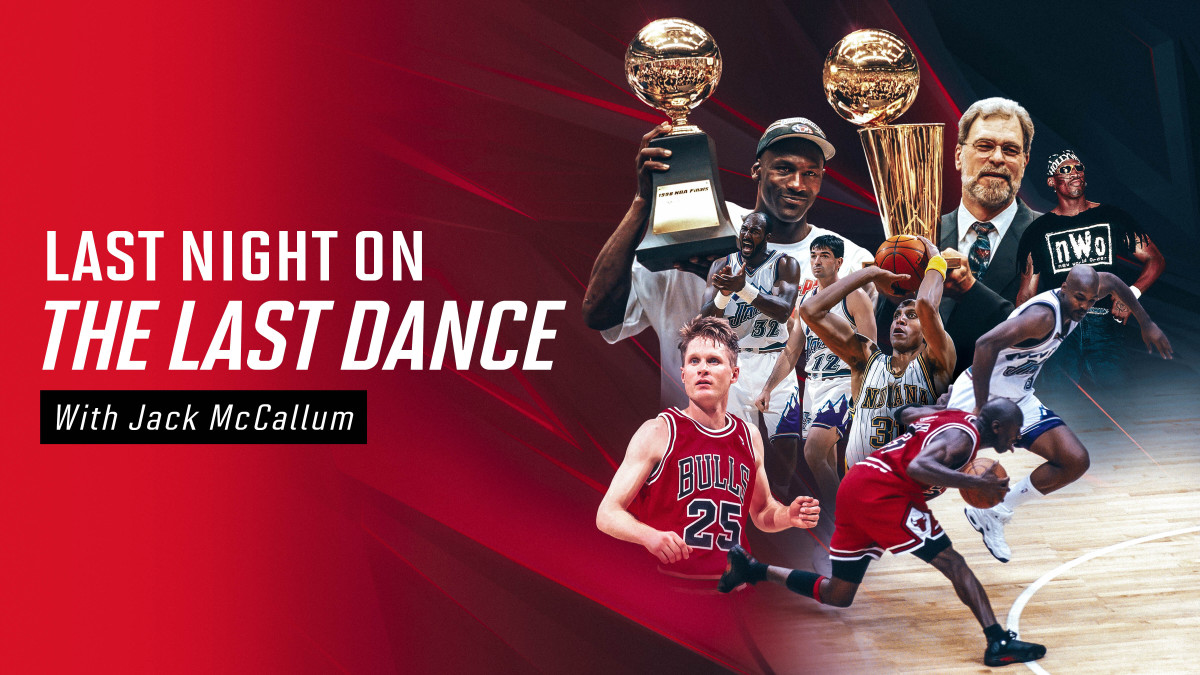
To read previous 'The Last Dance' recaps, click here.
Remember that what we see is most definitely not Today’s Game. This is Your Father’s Game. The Bulls, with the most terrifying scorer in NBA history (aside from, maybe, a couple exceptions, like early Wilt Chamberlain and early Elgin Baylor), scored 100 or more points only 10 times across 40 playoff games in those two seasons. In 1998, Reggie Miller, one of the early kings of the three-point shot, made only 17 threes in seven games; Jordan made only six against the Pacers, even though their demanding interior defense mandated a perimeter offense. The Jazz, with as functional a one-two punch as the game knew at that time—Stockton-to-Malone on the pick-and-roll . . . Stockton-to-Malone on the break—scored a total of 54 points in the entirety of Game 3 of the ’97 Finals. Fifty-four.
“This is actually the score?” Jazz coach Jerry Sloan asked after that game. “Is this the final?” I really do think he was serious.
***
And so, on to some basketball stuff:
- In Game 5 of the 1997 Finals, in Utah—the “Flu-Pizza Game,” which we’ll get back to—the score is tied 85-85 with about 30 seconds left. Jordan has it, top of the key, guarded by Bryon Russell, who will become the pushed-off patsy a year later. Scottie Pippen posts up on the block and Jordan throws him the ball. Everyone knows it’s coming back. Yet … Russell starts to edge toward Pippen, to double him. I’m screaming at the TV—Why are you doubling, you idiot!? Don’t leave Jordan!—even though I know what’s going to happen.
Eight years later, Game 5 of the Finals in Detroit, Spurs-Pistons. Detroit leads in overtime, 95-93. Ball goes to Manu Ginobili in the corner, and Rasheed Wallace goes over to—Don’t double! Don’t leave Robert Horry!
There are some things you just don’t do, beyond spitting into the wind. Ginobili is great, but you don’t leave a red-hot Horry, who sinks his fifth three-pointer as the Spurs win. And though Pippen was entirely capable of making some kind of shot near the basket, you don’t leave Jordan in the clutch. His jumper gave the Bulls the win.
- In Game 4 of that heated 1998 Eastern final with Indiana—between the Pistons, the Knicks and the Pacers, the Bulls had a more wearying and parlous time winning the East than they ever had winning it all—the Pacers trail 94-93 with 2.9 seconds left. Miller, who was so engaging in the first few minutes of Sunday’s show that it seemed for a while that the doc had switched subjects, is going to take the final shot. Everybody knows it. He starts down near the baseline, underneath the basket, but the Bulls know he has to come to the perimeter to get the ball, where Jordan is waiting to switch onto him. Miller knows it, too. So, with Jordan—"Black Jesus” or "that Black Cat,” as Miller called him—lurking, Reggie goes right to Jordan’s chest with a shove and a push, knocking him backwards, the kind of call that would almost never be made, not on Indiana’s home court, anyway. Reggie gets the ball in space and cans a three-pointer. Game, Indiana.
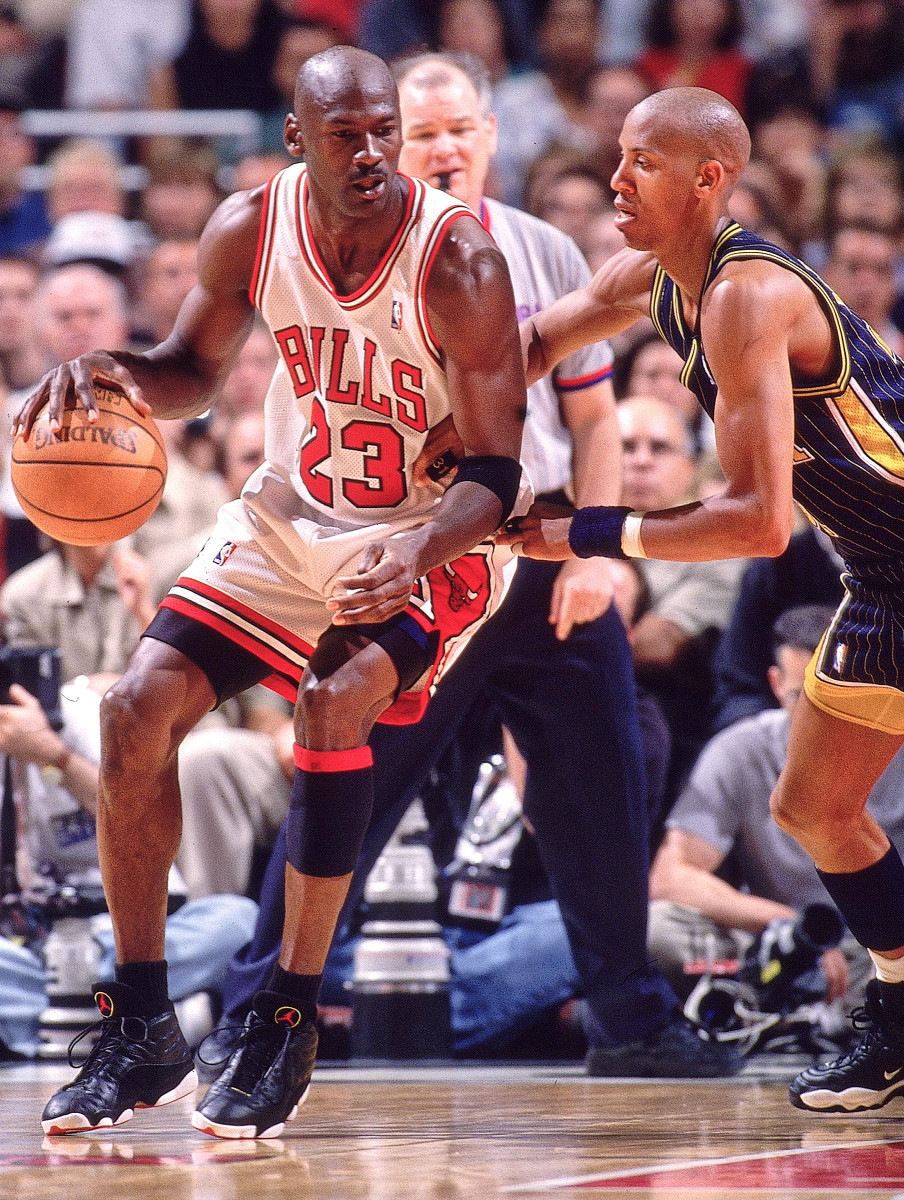
- Jordan tells director Jason Hehir that losing the 1996-97 MVP race to Malone “fueled the fire” for the Finals. (If you’re scoring at home, that was the 673rd Jordan motivational reason proffered across 10 hours of documentary.) Let me here do some musing on the MVP race. No one can adequately explain the criteria for becoming an MVP. Yes, the award quite often goes to the best player, as in when Jordan won in 1988, ’91, ’92 and ’96. Between ’84 and ’92, Larry Bird, Magic Johnson and Jordan were the only ones to win, and it’s a reasonable supposition that they were the three best players in the league.
But as a voter, that gets old. Speaking for myself, I searched for reasons not to give it to one of those obvious guys. That may not be fair, but it’s reality. I voted for Charles Barkley in 1993 because he had a great year and his Suns won a league-high 62 games. But did I really think he was more valuable than Jordan? Not for a second. I didn’t have a vote in ’97, but my guess is that I, too, would’ve gone for Malone. The Mailman’s case wasn’t even as strong as Barkley’s was, outside of the fact that the Jazz just ran through the West. We needed something, though, to break the Jordan streak and reward another great player.
I’m not saying Barkley and Malone were bad picks; I’m saying only that no one can truthfully make the argument they were more valuable than Jordan. That’s how I see it, anyway, and that’s sure as hell the way Jordan sees it. I have little doubt that LeBron James, decades later, gets hurt by such Let’s find somebody else thinking. He hasn’t been the MVP since 2013, but isn’t it impossible that he wasn’t the most valuable player in one of those years? He already had four MVPs, though, so … let’s find somebody else.
- There’s a great juxtaposition of Phil Jackson moments in Episode 10, which early on goes to the Bulls’ locker room before Game 1 of the 1998 Finals. Jackson is talking about “your breathing,” “your centering” and “getting yourself focused” as Jordan strolls by, probably thinking, I got your centering right here. The next time we see Jackson is in a fourth-quarter huddle, the Bulls down 79-77. “Guys, this is a scary f------ situation,” he says. “This game should be dead f------ meat.” Phil wasn’t always so zen. Chicago lost that game.
- Then again, Jackson’s shoulder-shrugging reaction to Dennis Rodman’s skipping out on practice between Games 3 and 4 of the 1998 Finals, so that he could bang chairs over heads in a WCW wrestling event with Hulk Hogan, was pretty damn zen. Rodman no doubt felt an ancient calling. The event was at the Palace of Auburn Hills, where he began his career with the Bad Boys Pistons.
- It was interesting to hear Steve Kerr say that “John was my guy,” referring to John Paxson. Over six titles—the first three for Pax, the second three for Kerr—those guys were exactly what Jordan needed. Give general manager Jerry Krause the credit for seeing that.
As with Paxson, who is remembered for his 1993 Game 6 dagger that gave the Bulls the championship over the Suns, Kerr is known primarily for his Game 6 jumper that clinched the ’97 Finals. Since I’m obsessed with naming games, you could call it “the Gatorade Game” as well as “the Kerr Game.” Hiding his voice behind a cup during a crucial timeout, Jordan tells Kerr to be ready because, most assuredly, Stockton will drop off of him to double Jordan. “He comes off, I’ll be ready,” says Kerr, who laughs on the documentary about how loudly he said it, he not being as accustomed as Jordan to having the camera on him. Anyway, Stockton comes off. Jordan passes. Kerr hits. Chicago wins the championship.
And, again, as with Pax, Kerr’s contributions went beyond that one big shot. I had forgotten how clutch Kerr was in that fraught 1998 conference final against the Pacers, just as Paxson was in the fourth quarter against the Lakers in the ’91 Finals. It’s almost like Paxson and Kerr had shown up at an audition for the same role in the same play, years apart: Jump shooter to supplement leading man.
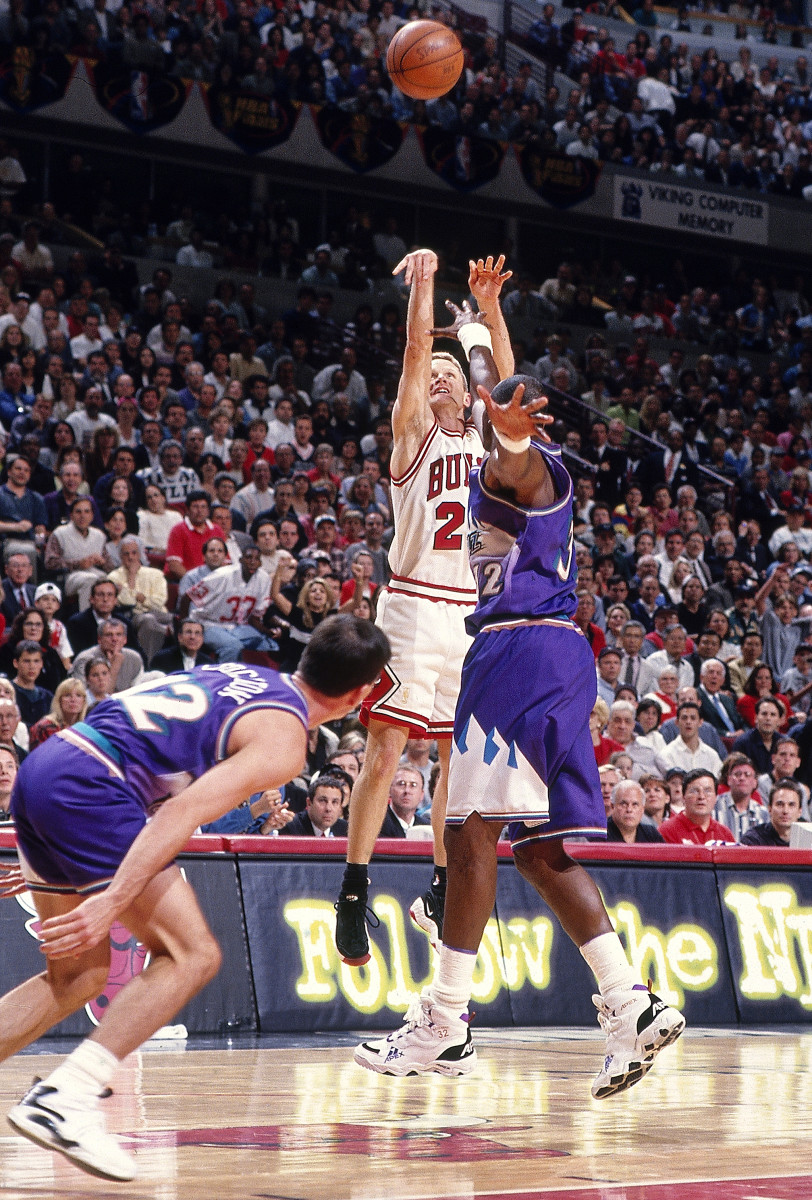
***
And, so, at the end of five Sundays and 10 hours, what do we think? Was the doc too long? Or, put another way, could it have been shorter? They’re not necessarily the same thing.
Yes, The Last Dance probably could’ve been, say, a six-hour project. Certainly an eight-hour project. One ongoing joke has been that Ken Burns needed only 90 minutes more to tell the story of the entire Civil War. To be fair, Rodman wasn’t in the Civil War. But, sure, there was repetition: too many teammates telling Jordan is a bully stories; too much of the smoldering I’m gonna kick his ass Jordan; too much Jerry Krause screwed us, though Pippen does give the general manager grudging props near the end. (Krause will get his say from beyond the grave.)
At the same time, I’m not sure the whole thing was too long. There were characters we didn’t see enough of, like Jordan’s children, Jeffrey, Marcus and Jasmine, who light up the screen in their one minute of Episode 10 air time. “I wasn't interested in the opinion of any wife or kids in this,” Hehir told Richard Deitsch at The Athletic. “We had the storytellers we wanted, and I felt like we had the story covered from every angle.”
Well, maybe. But it’s a good bet that Heir Jordan had a lot to say about keeping family air time to a minimum. Juanita Jordan, from whom Michael divorced in 2006—divorce proceedings had been instigated by the wife as early as ’02—was never too much in the picture, even when she was in the picture; and neither is Jordan’s current wife, Yvette Prieto, with whom he has twin girls. One could applaud Jordan’s efforts to keep his children out of the spotlight. Except that …
Not only was Jordan’s close relationship with his own father, James, closely explored in a couple of episodes (as it should’ve been), his close ties to another man, the head of his security team, the late Gus Lett, was the subject of several emotional minutes in Episode 9. “He became like a father figure to me,” Jordan confesses as he talks about Lett suffering from lung cancer during the 1997-98 season. “I had to have him next to me everywhere I went.” (That was for sure. You rarely saw Michael without Gus, who died in 2000.) Lett’s wife, Tisher, reveals that Jordan, would sometimes miss his own father so badly that he would call her husband in the middle of the night, and Gus would invariably rush out to console him. For a man who so closely felt the presence of a father—who needed a father—it would’ve been nice to see Jordan actually be one, even for a couple of minutes over the course of 10 hours.
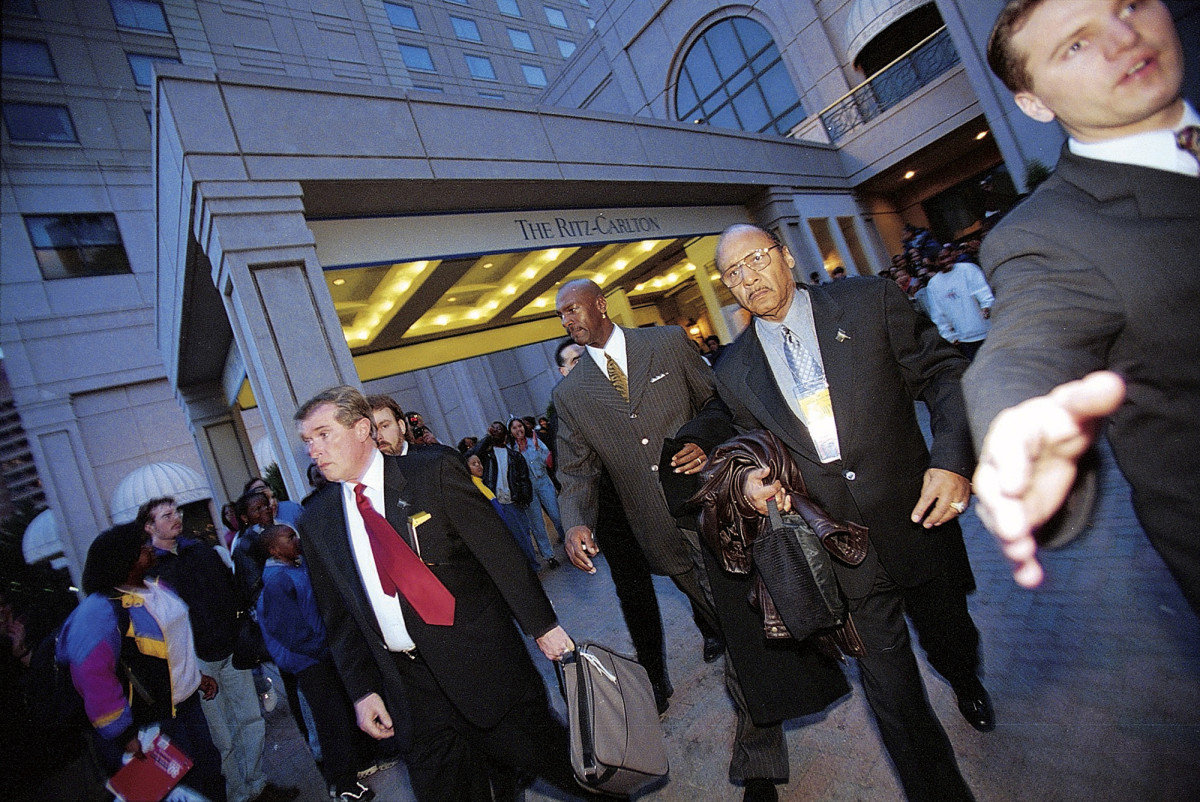
Hehir asks Jordan’s sons if they attended the 1998 Finals in Utah. “No, says Jeffrey, smiling. “We were watching in the basement.” Adds Marcus: “[Juanita] felt like Utah was a little hostile for us.” Jasmine doesn’t remember anything about the series except the hostility from the crowd. “It was brutal,” she says. (The Jazz had even trotted out Michael Buffer, the “Let’s get ready to rumble” guy.)
The context seems light, but the subtext is race. Hehir doesn’t dwell on it. In fact, race hardly comes up, which is extraordinary for a 10-hour show centered on a seminal African-American athlete—but the director makes his point by focusing on the crowds in Indiana (during the 1998 Eastern Conference final) and Utah (for both Finals in ’97 and ’98). These weren’t the only bloodthirsty folks in pro sports, but the almost-all-white constitution of the assemblage turned up the hostility meter. I felt it myself every time I went to Utah, more than in Indiana. And the blonde Pacers fan who makes two bellicose F-bombing appearances? She must feel very proud of herself two decades later.
If The Last Dance was too long, well, it came along—deliberately, since ESPN moved up the date—at exactly the right moment, at a time when we needed a communal sports experience. Sure, the ratings tumbled from the astronomical 13-plus million of the first two Sundays, but they remained extremely high for a show that went on and on … and on. A friend of mine, younger by 30 years, told me that at an appointed time before the show each week he and several friends would discuss via Zoom what they expected to see. Then watch. Then reconvene. The Last Dance became a ritual, a meeting place for a society that to a large extent wasn’t going anywhere. It was like that for thousands of people who had either watched Jordan in his prime or had heard about him for so long that they needed to see what the fuss was all about.
“The Last Dance was like five weeks of Super Bowl Sundays for me,” says Scott Williams, who played for the Bulls in their first three-peat. “I planned the day around it, started thinking about it when I got up. Maggiano’s takeout. Chicken piccata? Or chicken marsala? Whichever. Set it up and watch the show.” Afterward Williams would sometimes exchange texts about the episode with some of his former teammates, like Cliff Levingston or Will Perdue. There was that level of interest from people who lived part of it.
It was a documentary that needed space, breathing room. It was, at root, about people who lived Big Lives, and not just Jordan. Like Jackson, who was raised in a fundamentalist household, took acid in New York and won championships wherever he went. Like Rodman, who lived on the streets, escaped to Vegas, banged wrestlers with chairs, befriended Kim Jong Un and played with an internal fury that few of us can understand. Like Pippen, who came out of nowhere, got roasted for a migraine and became a class unto himself, the complementary superstar. Like Krause, small and mysterious, who filled chess boards with pieces that led to championships, but who couldn’t get the kings and queens to like him.
And like Kerr, the co-star of the final two episodes, much as Pippen, Jackson and Rodman had been earlier in The Last Dance. Though outwardly different from Jordan, Kerr’s California upbringing was much like Michael’s in North Carolina: a sports-mad kid in a stable family that gave him support. Like Jordan, Kerr poured himself into basketball, made it his essence. And, like Jordan, he lost a father in a horrible murder, Malcolm Kerr having been assassinated by two gunmen in 1984, when Kerr was a freshman at Arizona. Steve carved out a career built on pluck and jump-shooting. He won three championships in Chicago, two more in San Antonio and three as a coach with the Golden State Warriors. Now he fearlessly stakes out his political positions on Twitter. Steve Kerr lives a Big Life.
But not as big as Jordan’s. “Michael lived a different life than the rest of us,” as Kerr puts it. Jordan was in the spotlight from the first moment he came into the league, and it just kept getting brighter and brighter and never turned off. Jasmine Jordan says she once Googled her father just to find out “why everyone is so intrigued,” what the hell all the noise was about.
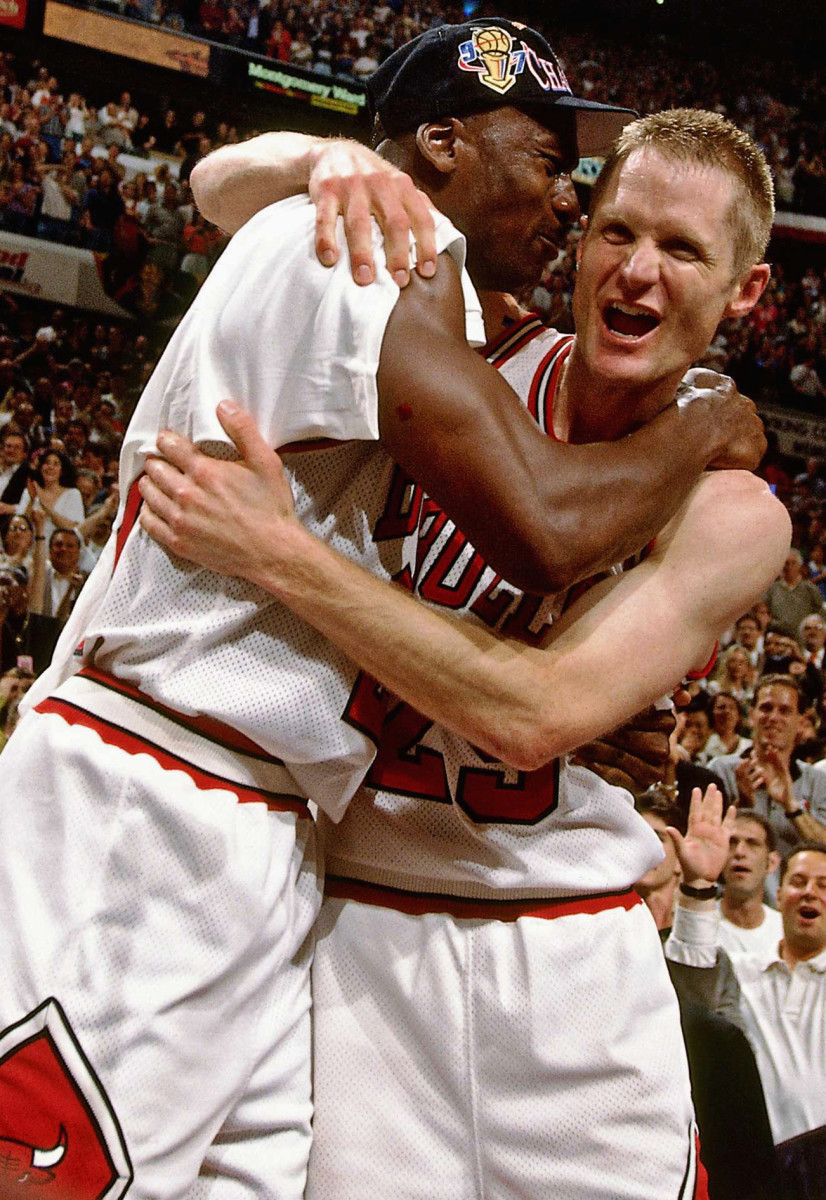
Nothing about Jordan’s life is normal. Kerr’s father is murdered, but the case is largely closed. Jordan’s father is murdered, and questions arise about possible tie-ins to his son’s gambling, even though there has never been evidence.
Pippen suffers a migraine in Game 7 of the 1990 Eastern finals, wilts completely, and the Bulls lose. Jordan gets sick before Game 5 of the ’97 Finals and it becomes a mystery that continues to this day. A late-night pizza delivery in Salt Lake City. Five guys come to the door, peeking in, trying to get a glimpse of the Holy One. The pie looks funky, says Jordan’s trainer, Tim Grover, who’s in Jordan’s room, and nobody eats it except MJ, who’s famished. He gets a bad case of presumed food poisoning—was it doctored pizza?—throws up the whole night and requires IV fluids through the morning. Then he goes out and, sweating like a fat man in a sauna, gets 38 points in 44 minutes. Bulls win. Pizza gives way to myth.
Shooters employ all kinds of chicanery to get open, like Reggie going “right to his chest” to push away Jordan and get off his game-winner in the 1998 Eastern finals. But who remembers? The “helping hand” that Jordan gave Bryon Russell to seal the second three-peat in the ’98 Finals, though—that will never be forgotten. Bob Costas called it “the equivalent of a maître d’ showing someone to a table,” but in Utah it’s remembered as the equivalent of a devastating left cross. Legend always follows.
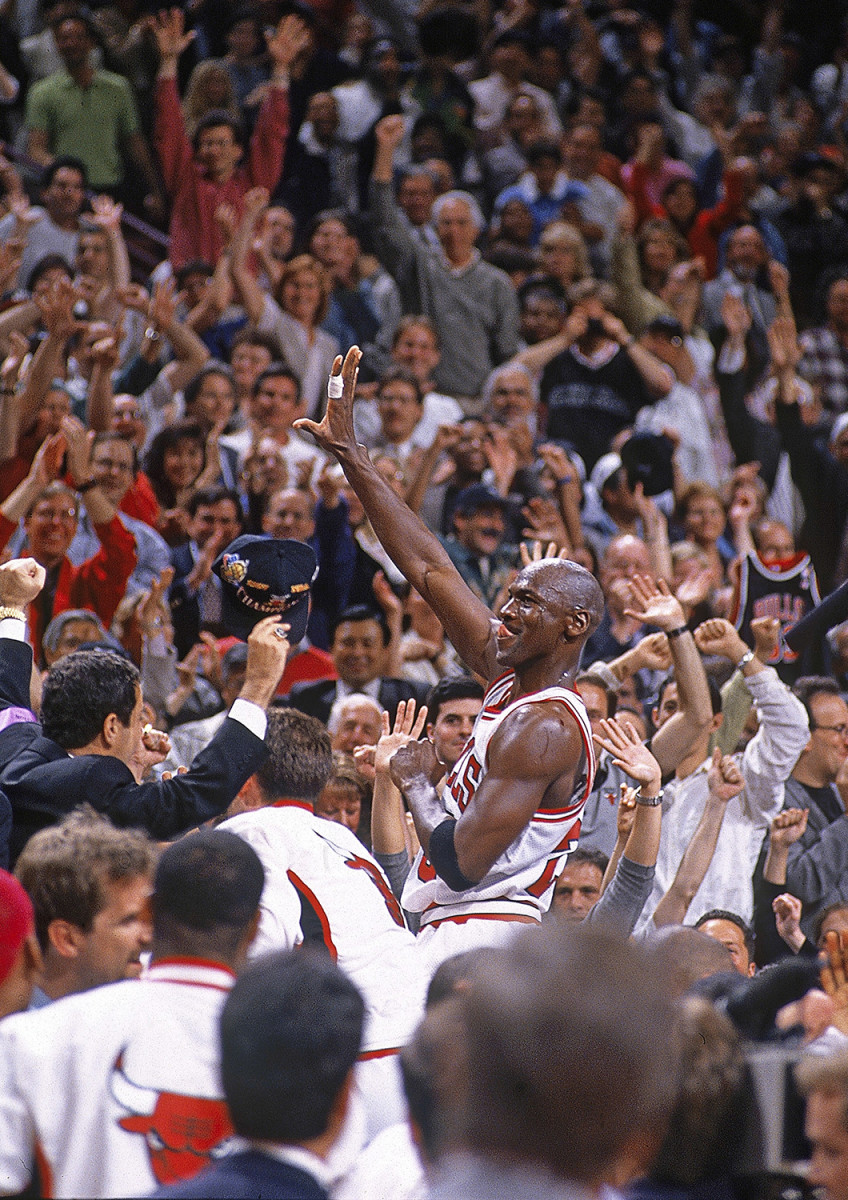
Indeed, by the summer of 1998 the Bulls were a full-blown Jordan creation. Sure, others deserve credit. Particularly Pippen and Jackson. But the motor was Jordan. The oxygen was Jordan. The Bulls did not win because they were better; they won because his collective will had turned them over the long and tortuous seasons into some kind of winning machine, immune to normal conditions and game logic. “It was like we were a ninth-grade jayvee team that had no shot,” says Jalen Rose in explaining the Pacers’ sudden inability to close out that ’98 conference final, when it seemed they were in control and were certainly the better team on paper. Down the stretch, when it mattered, Indiana simply got Jordanized. So did Utah. So had Phoenix, in 1993.
Could the Bulls have gone on for one more year, earned a four-peat and a seventh title for Jordan? He believes so—or at least believes that it was worth a try. Give everybody a one-year deal, Jordan says in The Last Dance, and I’ll do the rest. But it seems doubtful. Doubtful that Pippen, peeved with his previous contract, would’ve taken a one-year deal (unless it was for, say, $25 million, which he would not have gotten). And even more doubtful that Jackson would’ve come back, even though owner Jerry Reinsdorf, presumably against the wishes of Krause, had offered him that opportunity. Phil sounded finished, even if he ultimately sat out just one year before resurfacing with the Lakers. Maybe he just needed to get away from that Jordan magnetic force, as productive as it had been. Maybe L.A. had already been calling.
So Jordan couldn’t get that final season for his Bulls, and when he came back as a player for two years he couldn’t get the Wizards to the playoffs. Since he’s been at Charlotte he’s been unable to turn that franchise into a winner. But, can someone who’s able to seethe just sitting in a chair and remembering past grievances—Bryon Russell thinks he can cover me? Jerry Krause thinks Dan Majerle is a good defender? B.J. Armstrong dares to celebrate in my house?—possibly be happy? Sure, Jordan has his family and his fame and his fortune and his newly-opened exclusive golf course in South Florida, The Grove XXIII. He can make a call anywhere and get a table, get tickets, get whatever. Recall him at the beginning of Episode 10, headphones on, grooving to a Kenny Lattimore tune that isn’t even out yet but, you know, “he’s a friend of mine.” That’s Jordan’s life, the ultimate In Guy. If he was a character on Billions, he’d be sharing that specially-flown-in A5 Kobe strip steak with Bobby Axelrod, all the while talking about how he dominated the kid in the 1998 All-Star Game.
But if we grant him his eminence in his field—which I will do, and LeBron/Wilt/Kareem/Russell supporters are free to demur—at age 57 is Michael Jordan a happy man?
“Michael is absolutely happy,” says Mike Tollin, who in his role as one of three Last Dance executive producers got to know Jordan during filming. “He says whatever he wants, lets the world think what it wants, then goes back to his wonderful life. Intact. Satisfied. Comfortable in his own skin. Yes, he still cares deeply and he still competes intensely, but he’s laughing inside. He is present, focused and clear-eyed. Don’t discount the impact of Phil Jackson in that respect.”
Mark Vancil, a former Bulls beat reporter who went on to work for Jordan, uses the same word to describe MJ: present. “Most people struggle to be present,” he says. “Do yoga, meditate. ...Most people live in fear because we project the past to the future. Michael’s a mystic. He’s never anywhere else. His gift was not that he could jump high, run fast, shoot a basketball. His gift was that he was completely present. That was the separator.”
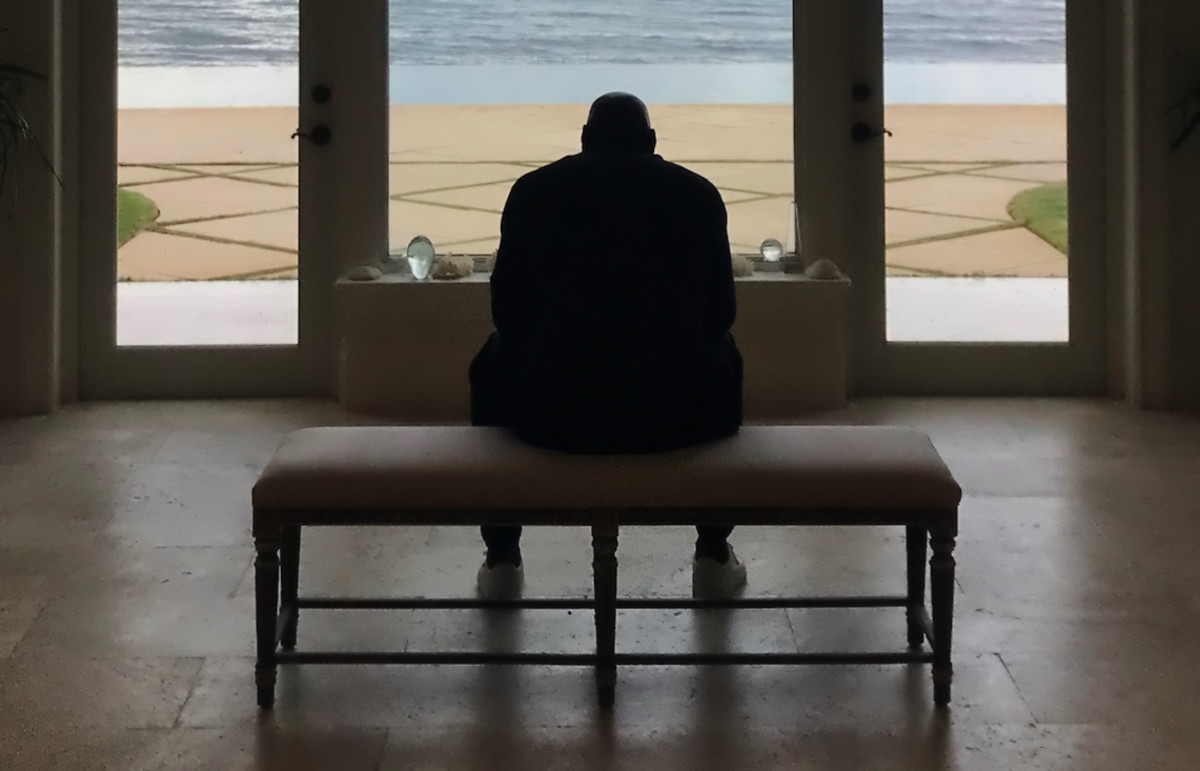
I can’t go that deep. I can’t classify Michael as a mystic, and I don’t feel qualified to judge him as happy, unhappy or somewhere in between. I never did know him as well as Vancil does. But when I was around him, he did have that gift of being in the present. When you engaged with him, he didn’t look past you. He was with you. Maybe some of that was learned behavior from Jackson, as Tollin suggests, but the point is that he took every question, every suggestion, as a challenge.
Which means that, to an extent, we missed the Jordan of today in The Last Dance—the Jordan who does live in the present and therefore smolders at how difficult it is for small-market teams like Charlotte to gain traction, gags at the reality that superstars organize themselves onto super teams with the help of super agents . . . and his own team is not one of the chosen ones. “Michael is not unhappy,” says Jackson, who keeps in touch with Jordan, “but he really wants that Charlotte franchise to be competitive.”
There is no shortage of teams in the same plight as the Hornets, of course—can we imagine a future time when even an established franchise like Portland gets to the top again?—but, from the Jordan we’ve seen over the last 10 hours, do you think he considers that a consolation? No way.
But, look: We came to The Last Dance to see Jordan the Conqueror, not to see Jordan sitting at his desk in Charlotte fuming over the salary cap. (O.K., he probably has somebody else do that.) We came to see him get the best of—partial roll call, please—Magic, Drexler, Barkley, the Glove, Reggie, the Mailman, Stockton et al. And that he does. He signs off in exactly the same way he signed on to The Last Dance: cigar in mouth, satisfied smile/smirk on his face, staring out a window onto a world that he knows he has conquered. Just not the current NBA world.
Jack McCallum covered Jordan for years as an SI senior writer and remains a special contributor to the magazine. The author of the New York Times bestseller Dream Team, he is the narrator of the new podcast The Dream Team Tapes, available here.
More From SI.com
Last Night on The Last Dance: Episodes 1-8
